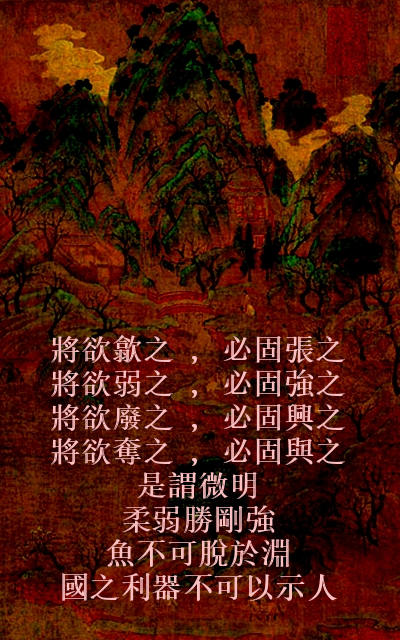道明 Tao Enlightenment Part Three #25

© Tao Enlightenment - bone structure of Daodejing #36 (English commas added).
Copyright ©2019 June 20, 2019
Within the Musings of a Chinese Mystic chapter named Illusions, Lionel Giles translated:
While they dream, they do not know that they dream. Some will even interpret the very dream they are dreaming; and only when they awake do they know it was a dream. By and by comes the Great Awakening, and then we find out that this life is really a great dream. Fools think they are awake now, and flatter themselves they know if they are really princes or peasants. Confucius and you are both dreams; and I who say you are dreams,—I am but a dream myself. This is a paradox. To-morrow a sage may arise to explain it; but that tomorrow will not be until ten thousand generations have gone by. (Musings of a Chinese Mystic, Lionel Giles, 1911)
Researching one's own dreams, aiming to learn more of the natures of one's own dreams, the research relies upon one's own ability to self-observe one's own emotions, self-observe one's own mind, and self-observe one's own sensory perceptions. The quotes given in Part 2 gave evidence that the 'enlightened master' was unable to self-observe his own mind and senses, which now helps to explain, in Part 3, why the individual invented imaginary beliefs of what dreams might be.
Some individuals, able to self-observe, recognize that one of the initial stages of entering a dream state, is when the conscious mind is no longer actively aware of one's sensory perceptions of the external environment. The sensory perceptions are greatly attenuated, and without there being a stable input of sensory information, the mind is then able to enter into unbridled imaginations.
Of the numerous changes within the mind when entering a dream, two of the deciding ingredients of whether the dream is a dream or real life, are [1] sensory perceptions of external things, and [2] the standard of what is real within this Reality.
Nature is the sole standard... Nature's gravity is a standard, that illustrates that it is illogical to believe that heavy rocks, or heavy people, float in the skies... Nature's system of cycles is a standard, that illustrates that it is illogical to believe that the morning sun rises more than once each morning...
Nature rules man... man's dream-like imaginations do not rule Nature.
Chuang Tzu, as described within the stories, had no conscious standards, no self-awareness of Nature... his mind, not able to be aware of his sensory perceptions... his mind, free to enter into dream-like imaginations of things that cannot be real within this Reality. Chuang Tzu's paradox, is not a paradox... it is merely a man's imagination of things that were invented in his mind... invented without sensory perceptions... invented without a standard of what is real in this Reality.
Perhaps Chuang Tzu was able to believe in the possibility that all is a dream, but individuals who are self-aware of their senses, and who are self-aware of the standards within Nature, it is obvious which is a dream, and which is not a dream.
Once upon a time, I, Chuang Tzu, dreamt I was a butterfly, fluttering hither and thither, to all intents and purposes a butterfly. I was conscious only of following my fancies as a butterfly, and was unconscious of my individuality as a man. Suddenly I awaked, and there I lay, myself again. Now I do not know whether I was then a man dreaming I was a butterfly, or whether I am now a butterfly dreaming I am a man. Between a man and a butterfly there is necessarily a barrier. The transition is called metempsychosis. (Musings of a Chinese Mystic, Lionel Giles, 1911)
If an individual is unaware of their own self, then, yes, perhaps the individual then cannot know whether he is awake, or in a dream. The alleged 'barrier', is self-awareness... self-observation... to be self-aware of one's own senses... be, self-aware of one's own mind... be, sufficiently self-aware enough to know the differences between Nature's standards, and one's own dream-like imaginations.
The noun-word 'metempsychosis' implies a soul beginning a new cycle of existence within a new body... reincarnation. If an individual were self-aware of their own mind and body, then they should also be able to discern which mind and body that the 'soul' or "I" resides in... if, not able to self-observe, then not able to have a standard sufficient enough to apply logic to know if one's self is the same as yesterday's, or might be a butterfly.
The book's 'enlightened masters' spoke lowly of the senses... the result, obvious... the individuals were unable to sense themselves... unable to sense Nature... they possessed no standard of logic... their beliefs, wild as dreams, all imaginary.
Sensory perceptions enable the sense of this Reality. The absence of sensory senses, enables dream-like fantasies of imaginations... enables, the imagination that the spirit of electricity dwells within all things... enables, the imagination that mermaids cause climate change... enables, the imagination that the Universe came into existence from binary nothings... enables, the imagination that reductionism could possibly be possible...
What is enlightenment? The word 'enlightenment' ought to infer an improvement over the ordinary mind... be judged as better... be more aware and awake than the ordinary mind. 'Enlightenment' ought not be the act of dream-like imaginations... not be the act of destroying one's senses... not be the act of claiming that one's self is not ruled by Nature's way. The word 'enlightenment', as is commonly used within philosophies, is but one more of the many noun-words that have no meaning, and have no connection to what is real within this Reality...
Perhaps, 'enlightenment', as how most commonly applied, might be more accurately defined, as, merely, a 'dream word'...